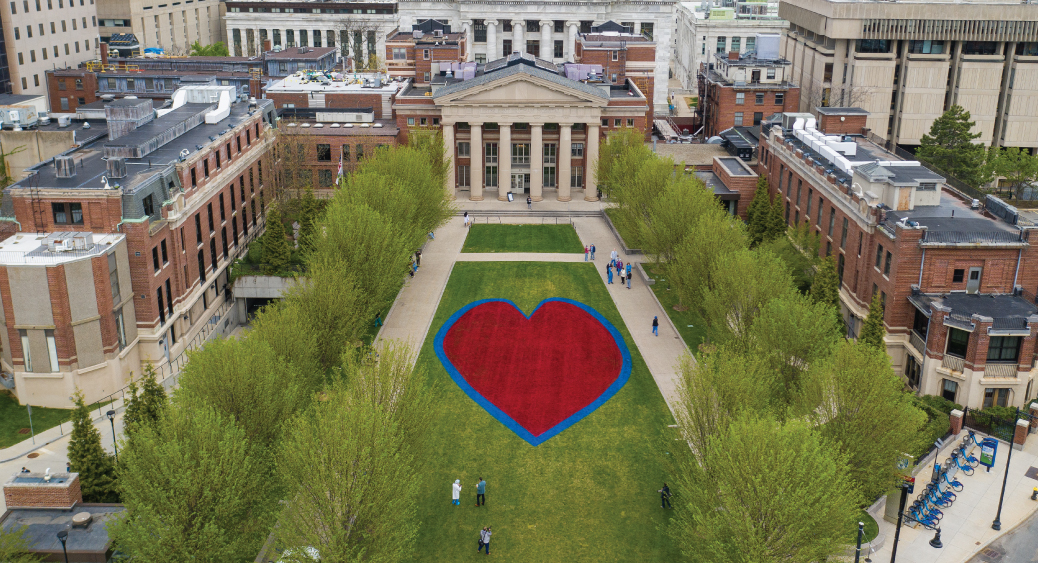
Philanthropy fuels the Brigham’s courage, innovation, and resilience
“The care and compassion our staff showed to patients and families is nothing short of heroic.”
-Madelyn Pearson, DNP, RN, NEA-BC
“I’m so proud of this extraordinary community of helpers and healers,” says Brigham and Women’s Hospital President Betsy Nabel, MD. “We hadn’t seen anything like COVID-19 before, and we remained united to keep the health and safety of our patients and colleagues at the heart of all we do.”

In March, the Brigham’s usual buzz of activity stuttered. Virtually overnight, routine services shifted to operate remotely, making room for hospital leaders and essential staff to prepare for patients arriving with suspected or confirmed illness. Clinicians adapted quickly to provide safe and skilled care in makeshift COVID units, despite the fears and pressures of grappling with an unknown disease.
“We went into this crisis thinking it would be all about the virus itself,” says Charles Morris, MD, MPH, who co-led the Brigham’s Incident Command Team, an emergency leadership group formed in January to oversee the hospital’s response to COVID-19. “Yet, we faced so many additional challenges, from shortages of PPE [personal protective equipment] to constraints on testing. Thankfully, between round-the-clock preparations and amazingly generous donations of cash and supplies, we were able to manage the surge in the spring.”
To aid patients and staff in their moment of greatest need, the hospital established the Brigham COVID-19 Response Fund in March. To date, more than 10,000 supporters—longtime and first-time donors alike—have given more than $21 million to the fund. Their generous outpouring went to immediate use caring for patients and frontline workers, expanding much-needed research, and addressing health inequities in the local community.

From top, counterclockwise: Using a protective testing booth built by the Brigham, staff members prepare to perform COVID-19 testing at a mobile testing site in Dorchester; a nurse provides compassionate care in the COVID Unit; and a member of valet services disinfects a vehicle at the hospital’s main entrance.
The Brigham community addressed the crisis head-on, often in remarkable ways. They converted the hospital and redeployed personnel to prepare for a surge of patients, and staffed hotlines to field questions from the community. They administered tests and care kits in neighborhoods hardest hit by the outbreak. When it was unsafe for visitors to come to the hospital, nurses and other staff served as a source of strength for patients and families—and each other.
“Every time I talk about our nurses, staff, and clinicians, I fight back tears,” says Madelyn Pearson, DNP, RN, NEA-BC, chief nursing officer and senior vice president of clinical services. “They are, by far, the most incredible team I have ever seen. The care and compassion our staff showed to patients and families is nothing short of heroic.”
The crisis also ignited an explosion of creativity and collaboration among the Brigham’s research community. Scientists uncovered crucial insights about the SARS-CoV-2 virus to inform and support the hospital’s COVID-19 response. The Brigham also teamed with Mass General to establish the Mass General Brigham Center for COVID Innovation. Uniting top talent from both hospitals, the center is rapidly developing new devices, diagnostics, data analytics, and therapeutics to take on the pandemic and prevent future outbreaks.
Meanwhile, the Brigham’s infectious disease and critical care experts were front and center in the media, reporting the latest science about the virus and informing the public at a time of tremendous uncertainty and anxiety. They also openly shared best practices to help peers confronting COVID-19 around the world.
“We are grateful to our Brigham community members near and far for their outpouring of support, concern, and action during this most trying time,” says Nabel. “When we look back on this time, we will remember the courage and resilience of our caregivers and staff, the dedication of our researchers, the strength of our patients and families, and the incredibly generous outpouring of support from our donors. We rose to the occasion together, and we will emerge from this stronger than ever—together.”